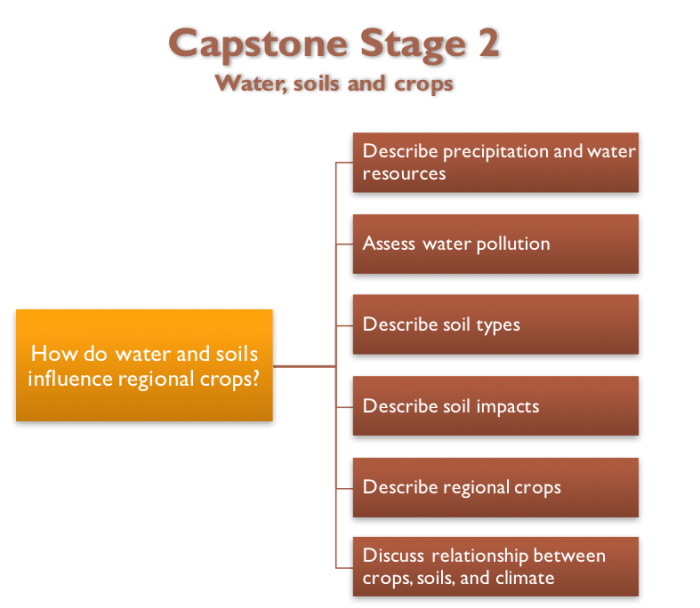Capstone Project Stage 2
Water, crops, and climate
The diagram below summarizes the topics you will explore in Stage 2 for your assigned region.

Capstone Stage 2 Water, Crops and Climate.
Click for a text description of Capstone Stage 2 image.
Capstone Stage 2 - Water, soils, and crops
How do water and soils influence regional crops?
- Describe precipitation and water resources
- Assess water pollution
- Describe soil types
- Describe soil impacts
- Describe regional crops
- Discuss the relationship between crops, soils, and climate
What to do for Stage 2?
- Download and complete the CapstoneProject_Stage2.docx worksheet that contains a table summarizing the data you’ll need to collect to complete this stage. Remember, you need to think deeply about each response and write responses that reflect the depth of your thought as informed by your research.
- Add relevant data to your PowerPoint file.
- Add questions and continue to research the questions in your word file.
- Capstone Project Overview: Where do you stand?
- At this stage, you should have started to investigate your assigned region and have added information, maps, and data to your worksheets and PowerPoint file for Stages 1 and 2.
Upon completion of stage 2, you should have at this point:
- Confirmed which region you will study for your capstone project and identified the members of your group.
- Initiated research and data compilation in the Stages 1 and 2 sections of the Future Food Scenarios table.
- a. Stage 1: Regional food setting, history of regional food systems, soil types
- b. Stage 2: Water resources, c, ops, and climate
- Created a PowerPoint file to hold the data that you are collecting about the food system of your assigned region. The information you may have:
- a. Labeled map of your region
- b. Soil map of your region
- c. Precipitation and temperature map of your region
- d. Major crops and crop families grown in your region
- Compiled an initial list of questions you have about your region related to key course topics and initiated significant efforts to answer.
